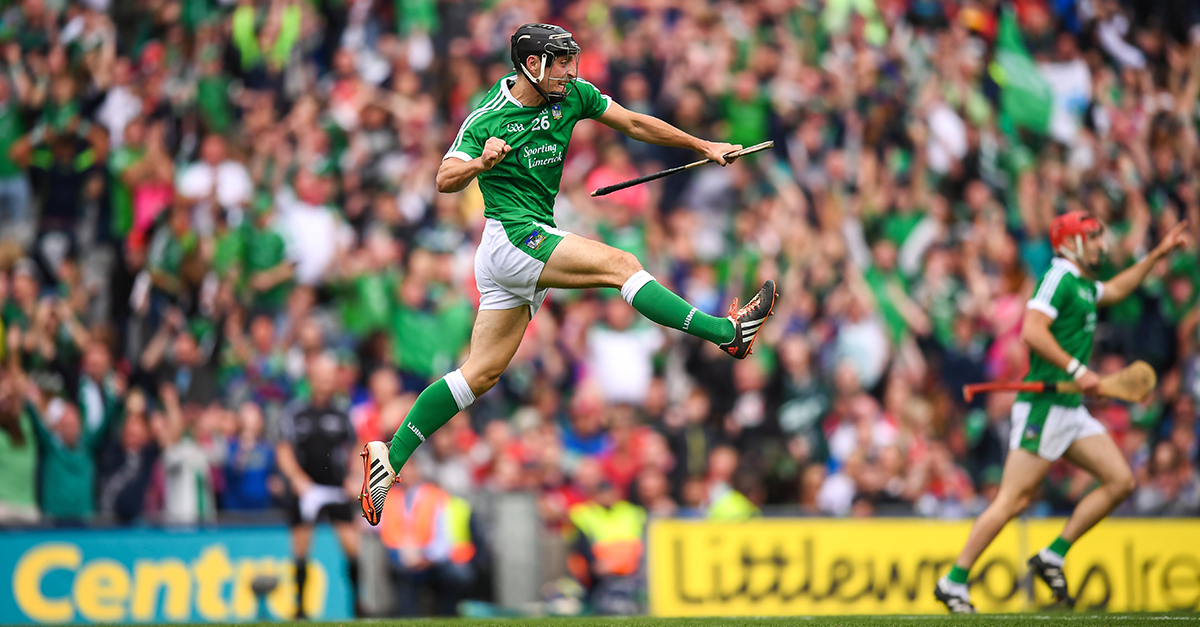Limerick. After the Ball Is Over.

By: Enda McEvoy
So it happened at last. Forty-five years of hurt ending at one fell swoop, or rather after eight agonising minutes of injury time. Limerick are All Ireland champions for only the second time since 1940. The nation rejoices. How could it not?
Now for a random question. Who’ll be the Hurler of the Year?
No need to answer. You won’t be able to answer quickly and decisively in any case, and that’s the point. There’s no obvious Limerick candidate for the award because this was a triumph for the collective.
The defence was solid. The midfield duo worked non-stop. The forwards all weighed in on different days. That’s how a team wins a championship.
Slight correction. The forwards weighed in every day. All six of them scored from play against Kilkenny in the quarter-final. Same again versus Cork in the semi-final. On Sunday five of them found the target.
Not for the first time this summer, it was the evenness of their performance – no wildly differing first halves and second halves with John Kiely’s charges – that saw them through.
Once more the scoring burden was shared. Three points from the half-back line, where Declan Hannon led like a captain by storming upfield to land two rousing scores. Two from midfield. A haul of 2-9 from the attack. And, of course, the inevitable contribution from a substitute, in this case Shane Dowling’s goal.
Entering the closing minute of normal time the underdogs led by eight points. That’s how much superior they’d been to a Galway outfit that barely showed up.
Given the fears had been expressed as to how well they’d settle and whether they might be blown away by an early scoring blast from the champions, Limerick needed to hit the ground running. They did. Although they drove five wides in the first four minutes they were winning ball, dominating possession and visibly the sharper team, with Nickie Quaid working his puckouts smartly.
Their four-point lead at half-time scarcely illustrated their dominance. What happened on the restart decided the outcome. What didn’t happen on the restart, rather.
All week we’d been hearing about Galway’s power surges. About how the MacCarthy Cup holders were only hurling in fits and starts but when they did hurl, well… The first half of the Leinster final replay. The first quarter of the drawn game with Clare. The first half of the replay.
Here, however, there was no power surge on the resumption. This was the equivalent of the dog that failed to bark in the night.
The men in green promptly went seven points up and when Tom Morrissey flicked the ball to the net on the three-quarter mark that seemed to be that.
Morrissey’s goal came about after he filched the sliotar from Gearoid McInerney. Dowling’s goal came about after Peter Casey blocked down Adrian Tuohey. The opening goal from Graeme Mulcahy came about after Seamus Flanagan left Padraic Mannion on his backside, with Kyle Hayes taking it from there.
Last year Galway weren’t being caught in possession or left on their backsides; they were the ones throwing their weight around. What a difference 11 months can make. Uneasy lies the head that wears the crown and all of that.
The upshot was that once more a team not managed by Brian Cody failed to make it two in a row. If the great man allowed himself a quick and quiet smile on Sunday evening he was entitled to.
Kiely declared afterwards that this was “only the beginning” for the winners. We’ll see. Clare came out of the blue in 2013 to win the All Ireland with a young and engaging team that seemed set for plenty more silverware before the decade was out. They haven’t been back to Croke Park on the big day in the meantime.
Limerick are now the hunted. Next year everyone will be out to get them. Ask Galway.
Will they be able to cope with the pressures of their new status? Can they continue to live up to the standards they’ve set themselves? It will make for fascinating viewing.
Last Sunday was glorious but it cannot be allowed become a one-off. Forty-five years is far too long a drought. As Kiely said, for Limerick this has to be a beginning.